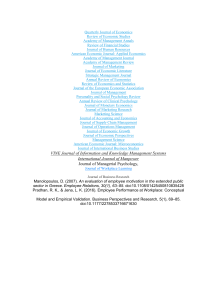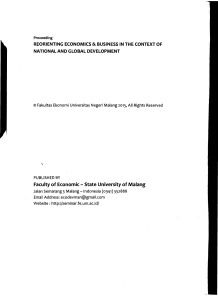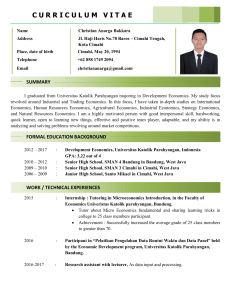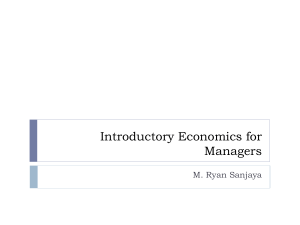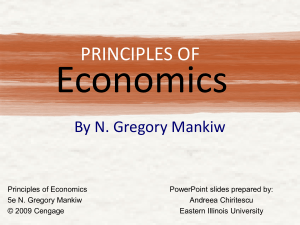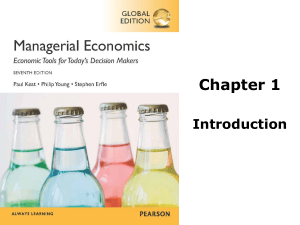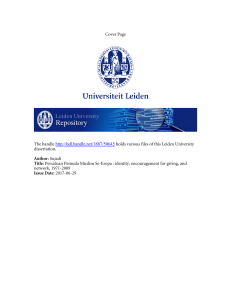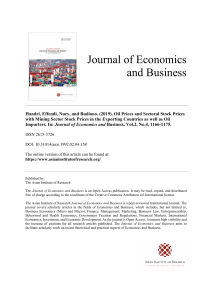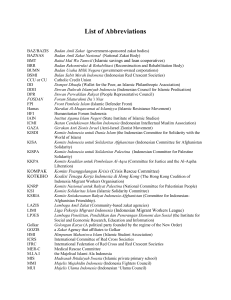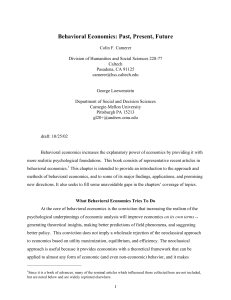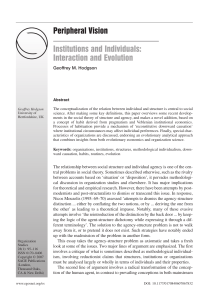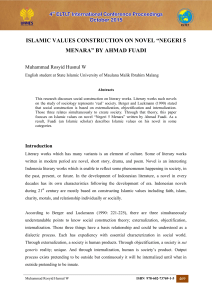Uploaded by
yoojungkim06
Efficiency and Employment in Shari'a Economics - Student Report
advertisement
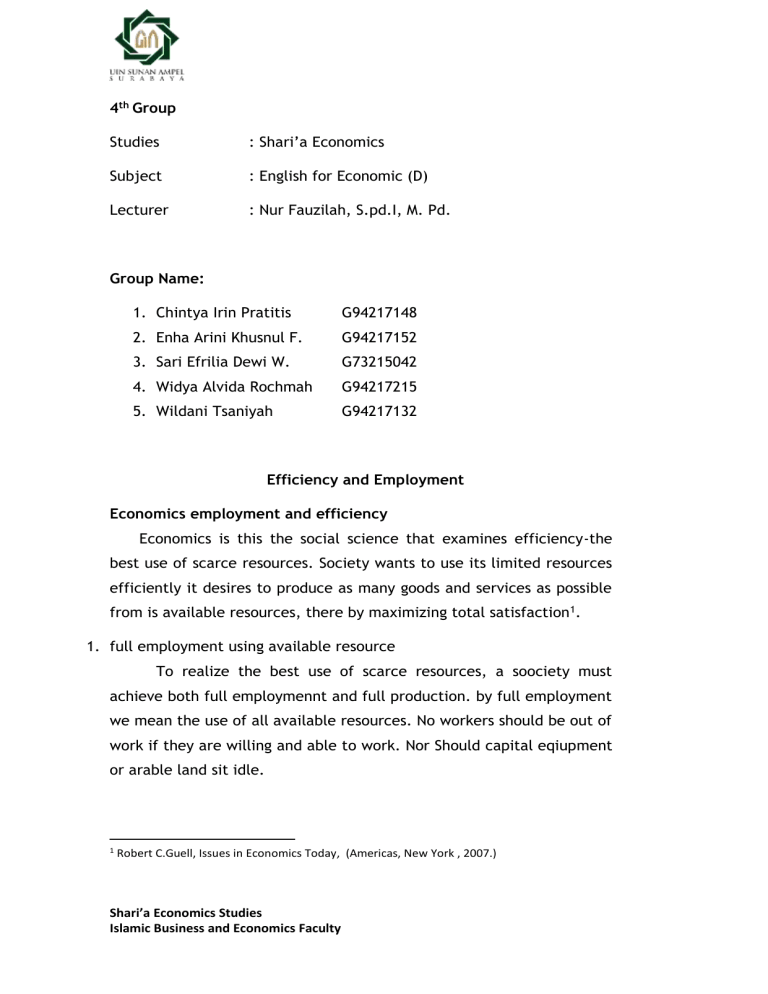
4th Group Studies : Shari’a Economics Subject : English for Economic (D) Lecturer : Nur Fauzilah, S.pd.I, M. Pd. Group Name: 1. Chintya Irin Pratitis G94217148 2. Enha Arini Khusnul F. G94217152 3. Sari Efrilia Dewi W. G73215042 4. Widya Alvida Rochmah G94217215 5. Wildani Tsaniyah G94217132 Efficiency and Employment Economics employment and efficiency Economics is this the social science that examines efficiency-the best use of scarce resources. Society wants to use its limited resources efficiently it desires to produce as many goods and services as possible from is available resources, there by maximizing total satisfaction1. 1. full employment using available resource To realize the best use of scarce resources, a soociety must achieve both full employmennt and full production. by full employment we mean the use of all available resources. No workers should be out of work if they are willing and able to work. Nor Should capital eqiupment or arable land sit idle. 1 Robert C.Guell, Issues in Economics Today, (Americas, New York , 2007.) Shari’a Economics Studies Islamic Business and Economics Faculty But note that we say all available resource should be employed. each society has certain customs and practices that determine what resources are available for employment and what resources are not. 2. full production using resources efficiently The employment of all available resources is not enough however. To achieve efficiency, society must also realize full production. By full production we mean that all employed resources must be used so that they provide the maximum possible satisfaction of our economic wants. If we fail to realize full production, economics say our resources are underemployed. full production implis two kinds of efficiency productive and allocative efficiency. a) Productive efficiency in the production of any particular mix of goods and services in the least costly way. b) Allocative efficiency is the least cost production of that particular mix of goods and services must wanted by society. Objectives Of The Employment Relationship 1. Efficiency Efficiency is the effective use of scarce resources and, because of the clear implications for competitiveness, economic development, and economic prosperity, efficiency is an important objective of the employment relationship. The standart economic definition of efficiency is Pareto optimality-no one can be made better off without making someone else worse off2. Otherwise,if someone can be made better of without harming someone else, the current situation is wasteful (inefficient) and resources are not being utilized as effectively as they can be. For the purposes of the employment relationship, focus on this last part- is labor being utilized effectivelly? Are products and services 2 Daniel M. Hausman and Michael, Economic Analysis and Moral philosophy, (Cambridge: Cambridge University Press, 1996). Shari’a Economics Studies Islamic Business and Economics Faculty being produced at the desired quality at a competitive, profitable cost? Is economic prosperity as high as it can be? A basic result in economic is that every perfectly competitive equilibrium is Pareto optimal (efficient). Therefore, neoclassical economics emphasizes the imporrtances of competitive markets, including competitive labor markets. In the legal arena, the efficiency ofself-interested individuals exchanging in free marketsis fostered by the common law elements of well-defined property damages. These economic and legal theories are mutually reinforcing. Consumers, workes, corporations, suppliers, investors, and other economic agents will maximize their individual welfare. If they can enter into contracts as equals in competitive markets, individual welfare maximization produces socially optimal, efficient outcomes. Unless these assumptions areviolated, laissez faireeconomicand legal policies allow freely adjusting prices-for inputs and outputs-to signal scarcity and relative worth and therefore guide as an invisible hand the participants to efficiency. Something that prevents the invisible hand from producing efficient outcomes is called a market failure. Market failures are controversial because many believe that trying to correct a market failure, such as through government regulation or subsidies, can make things worse, not better.for example, a common neoclassical economics argument is that increasing the minimum wage does more harm than good because it results in greater unemployment. There are also problems with the administrations and enforcement of public policies. Some market failures stem form features of real-word labor markets that are assumend away in the perfectly competitive neoclassical labor market. Perfect competition depends on employers and employees being economic and legal equals in the labour market, but verious real-word market imperfections can favor the employer. Employees likely have incomplete information about dismissal policies, accidents risks, or Shari’a Economics Studies Islamic Business and Economics Faculty pensions. Individual worker without the resources to purchase expertise will not be the legal equal of corporations with their cadre of lawyers. Internal labour market, unvested pension benefits, and employerspecific health insurance can increase a firm’s leverageby making workers less mobile. Lack of savings or other resources can further reduce employees mobility. These factors can turn perfect competition into excessive or destructive competition that drive wages and working conditions down. Atits worst, superior employer bargaining power can result in low wages, log hours, dangerous conditions, and arbitrary or abusive supervisory practices, but it can also be detrimental to efficiency by undermining trust, cooperation, and motivation. Or consider what was once called “industrial parasitim”- a company profits from paying low wageswith no health insurance while society pays for nutritious food for workers families and for visits to hospital emergency rooms for health care3. Other market failures stem form the human side of labor. Neoclassical economics disregards the human side of labor-workers with feelings and aspiration-so that it may be possible to increase efficiency by incorporating psychological and social concerns. Contemporary human resources management emphasize fair treatment- distributive and procedural justice-as an important mechanism for reducing turnover and improving employee loyalty, motivation, and performance. As discussed in the next chapter, labor union might enhance efficiency by increasing workers sense of equity and voice. In sum, because of the importance of using scarce resources effectively to promote economic prosperity, efficiency is a primary objectiveof the employment relationship. In the ory, perfect competitive yields efficient outcomes, but in real-world labor markets, there may 3 John W. Budd, Labor Relations: Striking a Balance, (New York: McGraw-Hill/Irwin, 2005) Shari’a Economics Studies Islamic Business and Economics Faculty be market failures and efficiency might be improved through government regulations, labor unions, or other mechanisms. Market proponets argue that many of these enhancement do more harm than good, but wideranging possibilities are summarized. To stimulate broad reflection about the possible elements of an efficient employment relationship. In short, the need for efficient workplaces is widely accepted; disagreements arise over how to achieve over how to achieve this goal. 2. Equity Equity in the employment relationship is a set of fair labor standardsthat respect human dignity and liberty and include both material outcomes and personal treatment4. In industrial relations, the particular concern with equity is rooted in the sometimes abusive and exploitive employment practices of the early 20th such as long hours at low wages in dangerous working conditions. 5 As such, the push for equitable employment outcomes focused to a large degree on minimum standardsminimum wages, maximum haours, minimum safety standards, protections against arbitrary discharge and favoritism. CASE RELATED TO THE TOPIC High Schools Grads 'Scarred' By High Unemployment The job market is still bleak for young people with only high school diplomas. Nearly half of high school graduates are still looking for fulltime work, according to a new report by Rutgers University's John J. Heldrich Center for Workforce Development. The national survey interviewed 544 recent high school grads from 2006 to 2011 who are not in college. Researchers say their hardship may have long-term emotional and financial consequences. 4 5 Budd, Employment with a Human Face Kaufman,” Labour Markets and Employment Regulation.” Shari’a Economics Studies Islamic Business and Economics Faculty Lowering Expectations Valerie Peterson, 23, lowered her expectations a long time ago. Unable to afford college and trying to find work with just a high school diploma during the recession in Columbus, Ohio, she had no choice. But she still has trouble getting her head around the reality of working the overnight shift at a gas station, earning an extra 50 cents over minimum wage — better than some of her old jobs at RadioShack and Wendy's, but still a long stretch from her dream to start and run a business. 'Eking Out A Living' The picture is equally dismal for millions of recent high school graduates, says Rutgers University professor Cliff Zukin, who co-directed the national survey. The study found most still live with family, and only 1 in 4 have full-time jobs. Of those surveyed who graduated before the recession between 2006 and 2008, 37 percent are employed full-time. Only 16 percent of those who graduated between 2009 and 2011, the worst years of the recession, work full-time. Zukin says it's not surprising that less than half believe they will ever achieve the American dream of doing better than their parents. "This is a huge swath of American youth that have no economic prospects right now for doing anything better than marginally eeking out a living," Zukin says. 'Something's Got To Give' Like most others surveyed, Neetasha Thomson, 24, of Memphis, knows she needs to go to college to get ahead, but she can't afford it. She managed to go for just one year. Five years later, she now works 50plus hours each week at Wal-Mart and FedEx to pay down that debt. Thompson applied for aid last year to go back to college again, but she found it still too expensive. But she is saving and planning to try again. "This is not what I want to be. This is not the life I want," Thompson says. "I mean, point blank, I don't want to be just wasting my life, working these two jobs. Something's got to give. Something's got to change." But Thompson, like the majority of those surveyed, believes it will take many years before she is financially stable enough to think about the big life milestones, like buying a home or starting a family. Shari’a Economics Studies Islamic Business and Economics Faculty Over the long term, Zukin says, this generation will likely be "permanently depressed," emotionally and economically. These recent high school graduates may never earn as much money as "people who came before them or people who came after them," he predicts. Zukin was also struck by the number of young people who said the most important thing they were looking for in a job was job security. At 24 years old, he says, you don't say that unless you've been scarred. THE SOLUTION : Unemployment that graduated from high school is quite sharply, namely almost reached 50%. Make a lot of them being permanently depressed, emotionally and economically. Just like Valerie Peterson said, whom graduated from high school can just work part-time and get very small salary that it’s difficult to life itself and even had to let go of her dream to college because financial difficulties. As you can see in Indonesia something like this is happen too, then what should we do? We have two options that can be chosen: 1. After graduate from high school, working for a year and then save the money and after quite can be used to go to college and during the college we can also followed schollarship, which is a lot of it. 2. After graduate we work and in other hand we can do business smallscale, and if the business turns out move forward, will provide advantage enough for us to develop the business and even can provide a new job to anyone that graduated from high school. So according to us, how difficult our situation right now, definitely there is always another way we can do to reach our dreams. Shari’a Economics Studies Islamic Business and Economics Faculty
